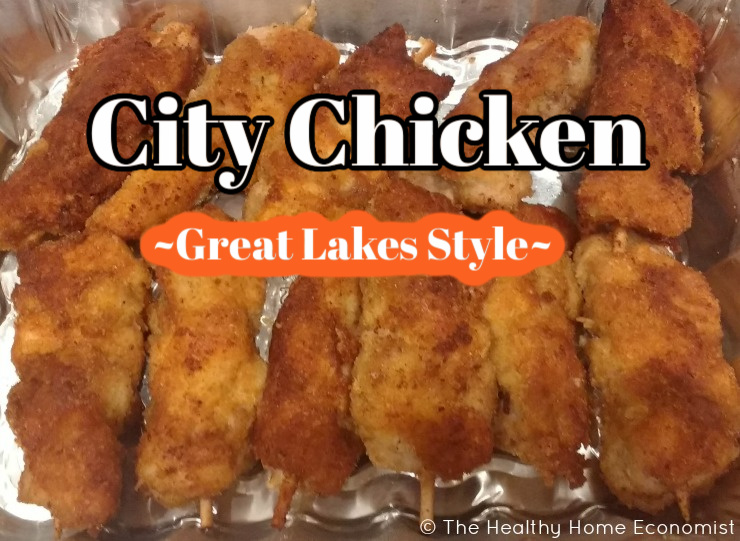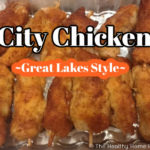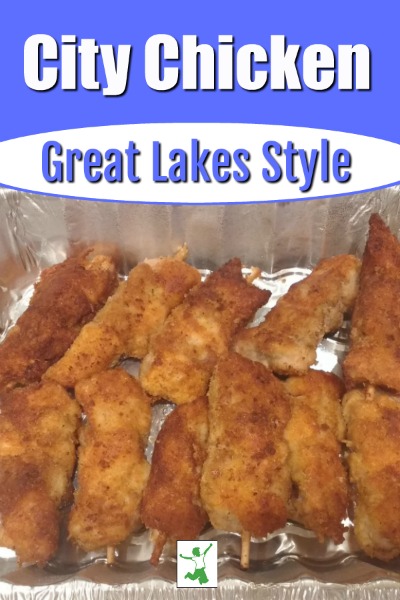Table of Contents[Hide][Show]
Tender and delicious recipe for City Chicken as traditionally popular in the Great Lakes region of North America made with alternative meats that are frugal and nourishing.

It’s might be hard to believe at first, but back in the days of the Great Depression, chicken was hard to come by in the cities. It was so rare, in fact, that when it was available, only the rich could afford it. To compensate, a regional dish known as city chicken became a popular substitute in the urban areas ringing the Great Lakes.
My Grandfather was a butcher in and around the Buffalo area during that time. As such, he cut up a lot of city chicken in his day which was made from small, alternating medallions of pork and veal skewered on 6″ sticks. The skewers resembled chicken drumsticks, hence the other common name for this dish – mock chicken.
Even once the Great Depression ended and chicken became affordable to buy in the cities during the 1950’s, city chicken continued to be a popular dish. It is still found in markets around the Great Lakes today.
One of my favorite comfort foods growing up was the incredibly flavorful and tender city chicken my Grandmother made using the top-quality meat my Grandfather continued to source even after he retired.
Ethical Veal?
Veal has long been regarded as a “cruel meat”. It was avoided by people who refuse to buy meat that was not raised ethically.
I myself had not purchased veal in over two decades since seeing the TV images of anemic, formula-fed calves tethered in crates where they could barely move (to keep their muscles soft).
Consequently, my Grandmother’s city chicken was not a recipe I ever made as an adult even though I loved it!
Big changes are afoot in the veal industry, however. Humane, sustainably raised veal is starting to become available in some areas, fueled largely by the grassfed movement.
I would like to think that those of us who refused to buy veal for so many years had something to do with this positive trend!
Veal from calves that are free to run around with their mothers in grassy pastures, never subjected to hormones or antibiotics, and treated with the utmost TLC is now increasingly available.
While this ethical, grassfed veal can’t be cut with a fork like the formula raised veal of old, it is still extremely tender. The flavor is also much improved. Unethical veal was known for being tasteless, but grassfed veal has a subtle beef flavor prized by top-end chefs who are starting to use it again.
With humanely raised, grassfed veal now an option, I am thrilled to finally be able to make this recipe for my own family and share it with you – continuing the tradition of my Grandmother, who was an amazing, traditional cook.
Rabbit or Lamb
If even after learning about grassfed veal, you still prefer not to eat it, note that you can substitute rabbit instead. Rabbit is available at many local butcheries and is very inexpensive.
Depending on where you live, lamb may also be a frugal alternative to consider.

City Chicken Recipe
Healthy, tender and delicious recipe for city chicken just like Grandma used to make which ironically contains no chicken at all as was traditionally popular in the Great Lakes region.
Ingredients
- 6-8 skewers pastured pork and veal alternating medallions
- 1 egg
- 1/4 cup whole milk preferably grassfed
- 3 Tbl coconut oil expeller pressed
- 1 cup sprouted flour
- 1/2 tsp sea salt
- 1/4 tsp pepper
Gravy (optional)
- 1 cup chicken broth
- 1.5 Tbl sprouted flour
Instructions
-
Prepare the skewers with alternating medallions of pork and veal. You should have 4-5 medallions per skewer.
-
Beat the egg in a medium sized bowl. Mix in the milk, sea salt, and pepper.
-
To make the city chicken gravy, mix a few tablespoons of the chicken broth with the flour in a bowl and blend until smooth. Add to the rest of the chicken broth and set aside.
-
Sprinkle the cup of sprouted flour evenly on a large plate.
-
Dip each skewer in the egg mixture. Roll each skewer in the plate of flour until the meat is covered completely.
-
Heat the oil in a large fry pan on medium-high heat. Cook each floured skewer for about 4 minutes, gently turning each one until browned on all sides.
-
Place all the browned skewers in a large baking pan. Pour in optional chicken broth gravy and cover with foil. Bake at 350 °F/ 177 °C for about 45 minutes.
Recipe Notes
Wooden skewers (6 inch/ 15 cm long) are ideal for this recipe.
Use pastured lard or avocado oil in place of the coconut oil if desired.
Substitute rabbit and/or lamb medallions for the veal or pork if you avoid either of these in your diet.









Why are we picking on everything we say or do. You have a choice, do what you want. When I was young, we had nothing and any food was God’s gift. So shut up and be happy your not starving,or need a place for your head. Come on,you have nothing else to do but be picking on everything.? You now sound like our goverment
I totally agree. If some of you don’t eat veal or lamb that is you being you. Please don’t ruin a great recipe with your drivel. Veal is fantastic. I love it. There is nothing better than a grilled veal steak. I enjoy lamb also. The real point is that this is a good recipe with some history around it. Thank you Sarah for your expertise.
Sarah,
How do you cut the meat into medallions?
The butcher does it for you when you order your city chicken.
*posted too soon, or rather my toddler did. So anyway, farms are often selling costume to people or to skincare companies etc to make expensive lotions.
As for who may have helped pave the way for rose veal I’d suspect it has more to do with the rise of organic dairy rather than abstinence from veal or perhaps a combination of both. None dairy farms can usually choose the sex of their calves with something like 99 percent accuracy rendering male calves a waste product almost exclusive to the organic dairy industry.
As for morals the author was the one who brought those into the discussion, a simple recipe could have been shared. Seems more than a touch hypocritical that it’s OK for the author to share her distaste for veal kept indoors etc but she is offended that others find the killing and eating of baby animals. It is killing, what else can it be described as? I am not a vegetarian by the way, I eat meat but I do feel guilt about it, I don’t lie to myself about it though. Eating veal or lamb is eating dead baby animals, it is, the end. If you find that distasteful maybe don’t do it?
I think if the author stuck to refer to the grass fed veal as just that rather than ‘ethical’ there’d be less room for discussion. It may be better yes but I’m not sure I’d go so far as to refer to raising and killing any animal as ethical.
Also I’m sure it varies from farm to farm but most, even organic lovely, ‘humane’ dairies won’t have the calf’s running around with their mothers as they want to milk the mothers. I’ve visited several dairy farms and never seen calves running around with the cows, especially not for 8 or 9 months as rose veal is supposed to be. Veal calves are a product of the dairy industry remember so a lot are formula fed with many farms keen to sell even the colostrum as a health product to those
Funny story I have to share: growing up we raised rabbits. Lots of rabbits. We sold them for $5 to whoever wanted a pet rabbit. It always seemed like we sold a lot of rabbits–150 or more each year. I remember as a kid it always seemed we ate a lot of ‘chicken’. My favorite requested part was the wing and most of the time the ‘chickens’ my mom bought didn’t have wings. As a kid I never caught on. The name for our ‘chicken’ was City Chicken. Our chickens, it turns out were rabbits. It doesn’t bother me as up until the last year my husband and I raised rabbits as a source of healthy, organic meat for our kids. I still call it City Chicken–just for laughs. 🙂
My Grandfather was also a Butcher. I’m older then you, and I would NOT eat Veal, or Pig. Its just Cruel, and Barbaric.
Just because young baby animals have been consumed for years Does Not make it right.
I use to eat Lamb, but not anymore.
What you said, is almost like saying. Since so many people give there children vaccines it must be Right. Not.
Whether you choose to eat veal or lamb or pig is your choice which is fine! It isn’t a “right and wrong” issue however and to suggest that those who do choose to eat ethically raised veal or lamb or pig are somehow in the wrong or “barbaric” is inappropriate. Food choices do not give a person the moral upper hand on others with a free pass to judge.
I agree with Miriam. I will never eat veal because I consider them to be babies. The reason for my strong beliefs is that I am a former vegetarian. I’ll eat ethically raised animals, but not their babies. Saying that, I’m hoping someday to see grassfed mutton as an alternative to lamb on the market (impossible to find at my local Publix).
There is a reason there is no grassfed mutton or even much conventional mutton available in stores. Mutton is too strong tasting, sometimes very tough and pretty much unedible IMO!
Hey Sarah…would this work with coconut flour instead of a sprouted flour?
Possibly .. I haven’t tried it myself. Please let us know how it turns out if you try it!
An animal’s life is valuable at every stage of life. To take it is a somber decision no matter how big or small. We had very long-lived chickens that we did not eat simply because old chickens aren’t good for eating. Calves liver to me is preferable to beef liver because it filtered less and my family tolerates the flavor better. Your reference to “killing babies” is rather offensive as word-play to those who are prolife as I am. Seriously veal is not even remotely the same thing. I DO respect your position not to eat it however don’t moralize those of us who do. Pasture raised humanely handled farming practices should be supported. It IS ethical to eat young meats and that is NOT the signs of the times.
GOOD ARTICLE, THANK YOU and I can’t wait to try that awesome old-time recipe. 🙂 Looks delish!
I guess it is a sign of the times when we can now say that killing babies is ethical. Why on earth do we need veal? Most of us have grown up without it and in my humble (or not so humble) opinion we can continue that way. It’s one thing to grown animals for food but at least give them a reasonable life before we consume them.
Not sure what you mean by “sign of the times”? I guess you don’t eat lamb either. Young animals have been consumed for food for millennia even before the advent of farming and agriculture!
Miriam, God gave mankind dominion over the animals and allowed them to be used for food if properly bled first. Jesus ate lamb at the Passover. And he said not to judge. This is a personal decision for each individual. I respect your feelings but they are not law for others. Your words seem intended to hurt and insult. Maybe you could apologize to Sarah. This is her website and she can certainly post her opinions. We are free to not visit if we find her views distasteful, but not free to condemn. I’m happy that you advocate for animals but this isn’t the way to truly help them. I mean no offense to you but these are suggestions to help us all to be respectful of each other.